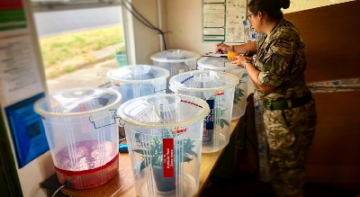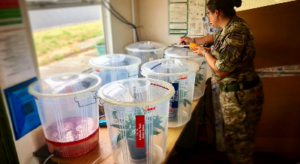
The Chief of the Air Staff, Air Chief Marshal Sir Mike Wigston, delivered a speech at Kings College London outlining his commitment for the RAF to become net-zero by 2040.
Current government commitments enshrined in law mandate that all greenhouse gas emissions be net-zero by 2050. However, the Air Chief Marshal seeks to transition the RAF to be climate change resilient and carbon-neutral a decade earlier. This path to 2040 is paved with ambitious sub-goals. These include having the first Net Zero airbase by 2025 and a NetZero estate by 2030.
The path to net-zero
The speech was candid; accepting the monumental task the RAF faces to reach Net Zero. The MOD makes up a significant proportion of the UK Government’s emissions. Within that, air and space activity represents a sizeable percentage. The changes will impact every area of the RAF and the ADS members who support and supply them. The proposed changes range from how the RAF power their aircraft, to the way they power their bases, and the way the RAF will ‘hold to account’ the supply chain and industrial suppliers about our own carbon and sustainable practices.
Not only will there need to be a complete overhaul in ensuring the equipment is environmentally friendly but the equipment will need added resilience to the harsh environments created by climate change. This could range from operating in extreme heat to being able to take off and land in increasingly adverse weather conditions.
Sustainable Aviation
It is estimated that three-quarters of the RAF’s carbon footprint is made by jet fuel. This in turn is just under half of the Ministry of Defence’s carbon footprint.
Crucially for ADS members, the RAF will piggyback on the developments made in the civil aerospace sector, showing that R&D investment in initiatives such as the Aerospace Technology Institute in net-zero technology has direct downstream benefits for the MOD.
The RAF are members of the Government’s Jet Zero Council (JZC). Led by the Secretaries of State at BEIS and the DfT the JZC discusses how industry and government can collaborate on achieving net-zero aviation. Key to this is the RAF’s continued commitment to promote Sustainable Aviation Fuel (SAF) and make it cost-effective.
The RAF is currently able to run on a 50% SAF blend on its aircraft, whilst is working with industry to achieve a 100% SAF powered flight as early as next year. Alongside increased sustainable fuel will be synthetic fuels developed by the RAF Rapid Capabilities Office. This brings several benefits to the RAF. For instance, synthetic fuels will help maintain the security of supply whilst burning cleaner, thus reducing maintenance costs and producing lower heat and visual signatures. Synthetic fuels will reduce the logistical tail of operations. The Air Chief Marshall even imagines a future where synthetic fuels could be manufactured at sea as part of a Carrier Strike Group.
The RAF may be leading the way, breaking world records in sustainable aerospace, but collaboration is truly global with 41 nations taking part in the RAF formed Global Air Chiefs Climate Change Initiative.
The announcement brings a huge shift in direction to the procurement practices of previous generations. However, the UK defence and aerospace industries are primed with the specialist skillsets needed to step up to the challenge. The UK is already leading the world in its transition and well-funded R&D projects can benefit both the MOD and civil aviation.






